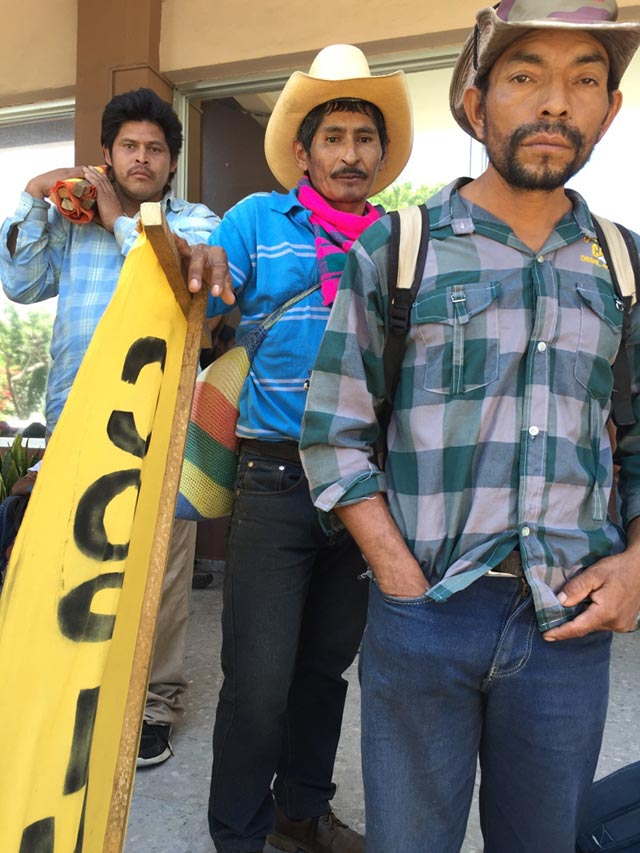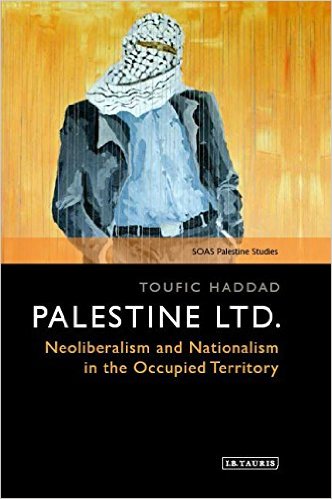Armed men wearing ski masks suddenly appeared in the distance. On a dirt road in northern Honduras, between the city of Tocoa and the small village of Punta de Piedra, a massive drug raid was underway. Dozens of men in bulletproof vests with high-calibre weapons swarmed the area: members of the Honduran military and police as well as US-trained Tigres and Cobra forces. They burst forcefully into this area where drug trafficking was rampant.
I was travelling toward the Atlantic coast when I was stopped at a roadblock and ordered out of the car. My translator, my driver, a local Indigenous leader and I were all questioned by the masked police officer about our destination, profession and intentions. What’s happening here, my translator asked? “Too many traffickers, even during the day,” the policeman replied. We discovered that the raid’s purpose was to find a local drug kingpin and anybody working for him.
However, the absurdity of the mission was soon apparent. After arriving at the peaceful town of Iriona Puerta, no more than 15 minutes away from the raid, I was shown the house of the chased drug trafficker. It was a large wooden structure overlooking a calm river, with apparently nobody home, adjacent to the government’s municipal building and across the road from the main police station. The drug boss had little to fear, I was told by locals, because officials in the district protected him.

The house of a drug dealer in the northern Honduran town of Iriona Puerta, July 2016. (Photo: Antony Loewenstein)
It was one small insight into the futility of American and Honduran efforts to tackle drug smuggling in the small Central American state. Honduras has long been one of Washington’s most “captive nations” in Central America, never independent from US dominance. Bertha Oliva, head of the leading human rights NGO Cofadeh (the Committee of Relatives of the Disappeared in Honduras), confirmed this view. “We’re like the ass of the US,” she told me in the capital, Tegucigalpa, meaning that her nation is always beholden to Washington and treated badly because of it.
US military funding for Honduras during the Obama administration has caused unprecedented levels of violence against civilians and environmental activists, and has exacerbated gang activity and local government impunity. Donald Trump’s presidency will likely worsen these current trends. President-elect Trump’s appointment of Gen. John Kelly to head the Department of Homeland Security is a worrying sign. Kelly was head of the US Southern Command during the Obama years and oversaw violent, counter-narcotic efforts across Latin America. He’s a drug war zealot.
The Deadly History of US Involvement in Honduras
I recently travelled independently across Honduras and visited remote and vulnerable areas to witness the reality for impoverished communities struggling to survive amid drug traffickers, corrupt police and government officials, US military personnel and extreme poverty. Collusion between Honduran military forces, big business and US assets has led to Indigenous communities being kicked off their lands and critics of the Honduran state being murdered.
I spoke to human rights workers, Indigenous leaders and victims of state aggression along with officials at the US embassy in Tegucigalpa to understand how this state has become one of the most violent countries in the world since a 2009 coup backedby then Secretary of State Hillary Clinton. The human toll continues to be devastating, with a 2016 US State Department report acknowledging that the majority of illicit drugs entering the United States still arrive through Central America.
Many times throughout my visit I felt scared, afraid to walk the streets during the day or night due to risks from gangs, police or the military. It was a fear shared by many locals living in the big cities. After Afghanistan, it was the most challenging reporting trip of my life. During my time with a family in the Tegucigalpa suburb of Flor Del Campo, I was told that many people barely left their homes because of regular police and gang killings. Everybody running a business had to pay a “war tax” to at least one gang; if they didn’t, they would be murdered. One Honduran politician, Maria Luisa Borjas, told me that members of parliament were making money from extortion.
It’s why so many Hondurans are fleeing toward the US (though receiving minimal support from the Obama administration and his immigration bureaucracy, which have deported more immigrants than any other period in history). Trump has pledged to militarize US borders even more and Hondurans, Guatemalans and El Salvadorians are rushing to the US border before he takes office.
José Asunción Martínez, 37, a leader with the Indigenous group COPINH and colleague of Berta Carceres, the Indigenous Lenca activist murdered last year, told me at the organization’s base in the city of La Esperanza that, “our country is a narco-state with narco-mayors and narco-MPs. They get funded by drug traffickers and when they get into power they have to pay traffickers back.” Martinez feared for his life after surviving multiple attempts to kill him.
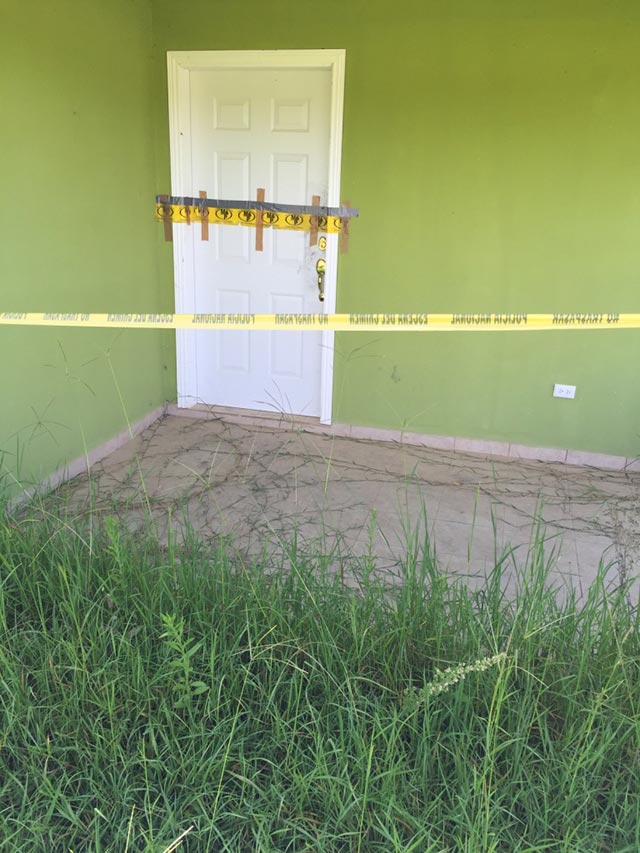
The house of murdered Honduran activist, Berta Caceres, in the town of La Esperanza, July 2016. (Photo: Antony Loewenstein)
“President [Juan Orlando] Hernandez wants more US money to fight a war on drugs, but we all know the funds will be used to suppress Indigenous people,” he said. “COPINH says that we don’t need the [Honduran] army in our communities. We want to cleanse our community of drug traffickers.”
An increasing number of voices in both the US and Honduras are calling for the severance of all US military aid to Honduras after the killing of Carceres in March 2016. Forces aligned with the Honduran army were responsible, according to a deserter from the Honduran military who spoke to the Guardian in June. The assassination resulted in a group of US Democratic Congress members pushing for the Berta Cáceres Human Rights in Honduras Act in July. They stated in an opinion piece that, “as long as the United States funds Honduran security forces without demanding justice for those threatened, tortured and killed, we have blood on our hands. It’s time to suspend all police and military aid to Honduras.” WikiLeaks documents and other information prove US and World Bank complicity in Honduran corruption.
This growing pressure is why the Honduran regime hired leading Washington PR firms, Ketchum and Curley Company, for more than US $500,000 combined, in 2015 and 2016.
Although there is vast evidence that Honduran police routinely collude with drug traffickers to kill people perceived as threats, the Obama administration has poured tens of millions of dollars into the Honduran military and police, with at least US $18 million in 2016 alone. The exact amount of US backing for Honduran military forces is unclear. The Washington Office on Latin America has submitted many FOIA requests over the last years and concluded that US money is likely contributing to the counter-narcotics and anti-gang known as the Xatruch task force and the National Inter-Institutional Security Force, or FUSINA, accused of killing human rights activists including Caceres. The US embassy in Honduras denied any responsibility for the violence and — during a rare, two-day tour in Tegucigalpa and San Pedro Sula — Ambassador James D. Nealon told me that Washington was having a positive influence on the country.
The US Congress designated US $750 million in aid for Guatemala, El Salvador and Honduras in December 2016 to reduce violence, poverty and the flow of migrants surging toward the US border. However, there’s currently little indication how that money will be actually spent. Honduras is also building a growing military alliance with Israel.
The US model for Honduras is clear. In 2012, the New York Times reported that the US was aiming to transplant the violent counter-insurgency tactics it used in Iraq and Afghanistan to Honduras to “confront emerging threats,” including drug smuggling.
Washington’s relationship with Honduras has a deadly past. From 1981 until 1985, under President Ronald Reagan, the US appointed John Negroponte as its Ambassador. Honduras became a vital staging post for US-backed death squadsoperating in Guatemala and El Salvador. The Nicaraguan Contras — right wing, brutal and funded by the US from the illegal sale of weapons to Iran — established a strong presence in Honduras.
Negroponte was a high-profile official in George W. Bush’s administration, serving as ambassador to Iraq from 2004-2005 and director of national intelligence from 2005-2007. He endorsed Hillary Clinton for president last August.
US-Caused Civilian Deaths in Honduras
One of the more recent notorious examples of US involvement in Honduras occurred on May 11, 2012, when a botched Drug Enforcement Administration (DEA) mission in the remote La Moskitia area caused the death of four Honduran civilians, including one pregnant woman, and countless injuries. A passenger boat was fired upon in the middle of the night; DEA and Honduran forces alleged they were shot at first and responded to defend themselves from armed drug traffickers.
I spoke to two surviving witnesses of the incident in Honduras, Clara Wood and Adan Nelson Queen, and both strongly denied these allegations. They said that the boat and its crew were working legitimately and they never saw any drugs on the vessel. They have never received any financial or psychological support from either the US or Honduras. They live with trauma every day. “They want to wash their hands of all this,” Wood told me on the northern, Caribbean island of Roatan. Wood claimed that US officials pressured her to change her testimony about what happened on that fateful night in 2012. They falsely insisted that men on the boat had fired on the DEA agents first, she said. Wood refused to comply despite being offered US $5,000.
The official response to this incident was obfuscation. The Honduran Security Minister General Julian Pacheco Tinoco told me that it was a “very regrettable incident.” The US Ambassador to Honduras, James D. Nealon, declined to comment when I asked him about the raid.
The former DEA chief in Honduras, Jim Kenney, based in the country from 2009 until 2012, was more forthcoming. Over multiple phone interviews from his home in Florida, Kenney explained the DEA’s point of view about the 2012 incident and why he believed it was justified. He expressed no sympathy for the victims of the 2012 incident and said they didn’t deserve any compensation.
“Bottom line, we were there to stop an interdiction of a major load of cocaine coming into the country,” he said. “We were doing our job.” He told me that, “If the [surviving] citizens there have an issue, they should be going after the Honduran government. It shouldn’t be a US response to pay for any of the, if you want to call it, ‘damages.'”
The Murder of Berta Caceres
La Esperanza, Berta Caceres’ hometown, was pretty, four hours by car from the capital, with far less violence than the major cities and bustling fruit and vegetable markets. The name “Berta” was spray-painted everywhere, commemorating the murdered environmental activist. Two massive, color murals of Berta were painted on the outside walls of the prison. Next to one, messages against police death squads were written in Spanish. Their English translations are “Police dickface” and “Police hit man.”

The mother of Berta Caceres, Austraberta Flores, at her home in the Honduran town of La Esperanza, July 2016. (Photo: Antony Loewenstein)
Caceres was killed on the outskirts of town in a house that stands empty today. It was an active crime scene with police tape around its entire perimeter. A solitary police car sat outside the house, and one policeman and soldier walked up to me as I approached the property, which is situated in a beautiful valley of trees, few houses and low hills. It was eerily quiet and still difficult to imagine the murder on a quiet night last March. The grass was overgrown around the green house, and all of Caceres’s possessions from inside had been removed. Her simple grave sat in a nearby graveyard, barely noticeable amongst the hundreds of other simple memorials.
At the sprawling Caceres family home in the heart of La Esperanza lives her mother, Austraberta Flores, and some of her children. Her mother showed me a memorial for Berta in one of the rooms with her daughter’s many global and local awards. Berta’s 24-year-old daughter Laura,who is usually in Buenos Aires studying obstetrics, told me that in the months before her mother’s death, “there were more threats against her. I used to stay in the house where she lived and was killed, and she wouldn’t let me stay there overnight,” Laura said. “She told me about the threatening text messages she was getting from the Desa company. There were 33 threats recorded since 2013.”
Caceres was the highest-profile opponent of Desa’s proposed Agua Zarca, a hydro-electric project in the western La Paz department. Originally backed by the World Bank, the hydro-electric facility was intended to be built on Indigenous land. The company had signed a deal with a USAID partner in December 2015. Both the World Bank and the engineering company hired to build the damn, Sinohydro Group, eventually withdrew from the project.
Under President Trump, Honduras is set to continue its position as a key transit point for cocaine into the US, because demand remains high and Washington values a reliable autocracy in Central America. High levels of violence will likely continue, forcing locals to flee. The result may well be even deeper US involvement across the region, including new military bases and further training of Honduran forces and police complicit in drug running and murder.
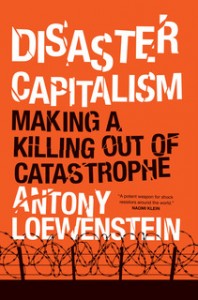
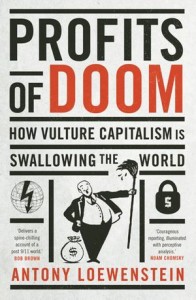 Vulture capitalism has seen the corporation become more powerful than the state, and yet its work is often done by stealth, supported by political and media elites. The result is privatised wars and outsourced detention centres, mining companies pillaging precious land in developing countries and struggling nations invaded by NGOs and the corporate dollar.
Best-selling journalist Antony Loewenstein travels to Afghanistan, Pakistan, Haiti, Papua New Guinea and across Australia to witness the reality of this largely hidden world of privatised detention centres, outsourced aid, destructive resource wars and militarized private security. Who is involved and why? Can it be stopped? What are the alternatives in a globalised world?
Vulture capitalism has seen the corporation become more powerful than the state, and yet its work is often done by stealth, supported by political and media elites. The result is privatised wars and outsourced detention centres, mining companies pillaging precious land in developing countries and struggling nations invaded by NGOs and the corporate dollar.
Best-selling journalist Antony Loewenstein travels to Afghanistan, Pakistan, Haiti, Papua New Guinea and across Australia to witness the reality of this largely hidden world of privatised detention centres, outsourced aid, destructive resource wars and militarized private security. Who is involved and why? Can it be stopped? What are the alternatives in a globalised world? 

 The 2008 financial crisis opened the door for a bold, progressive social movement. But despite widespread revulsion at economic inequity and political opportunism, after the crash very little has changed.
Has the Left failed? What agenda should progressives pursue? And what alternatives do they dare to imagine?
The 2008 financial crisis opened the door for a bold, progressive social movement. But despite widespread revulsion at economic inequity and political opportunism, after the crash very little has changed.
Has the Left failed? What agenda should progressives pursue? And what alternatives do they dare to imagine?
 The Blogging Revolution, released by
The Blogging Revolution, released by  The best-selling book on the Israel/Palestine conflict,
The best-selling book on the Israel/Palestine conflict, 